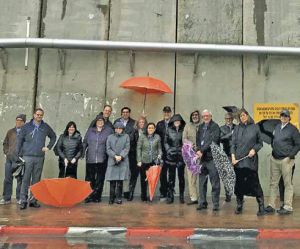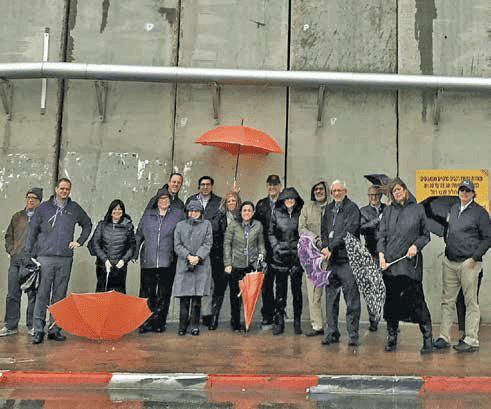 Last December, I was fortunate to accompany 12 amazing volunteers representing Community Relations Councils throughout the country and the dedicated staff of the Jewish Council for Public Affairs on a 10-day mission to Poland and Israel. The trip was in many ways a march through Jewish history over hundreds of years, including a literal long trip through a dark, brutally cold night from the historic city of Krakow into the bright and warm sun of the modern state of Israel.
Last December, I was fortunate to accompany 12 amazing volunteers representing Community Relations Councils throughout the country and the dedicated staff of the Jewish Council for Public Affairs on a 10-day mission to Poland and Israel. The trip was in many ways a march through Jewish history over hundreds of years, including a literal long trip through a dark, brutally cold night from the historic city of Krakow into the bright and warm sun of the modern state of Israel.
On the day we visited, the vast empty expanse of Auschwitz-Birkenau II stretched as far as the eye could see under a steel gray sky and lightly falling snow. For the most part, only ruins remain of the barracks and the crematoria that the Nazis constructed there beginning in 1941. A single rebuilt cattle car sits on the tracks as a reminder of the thousands of cars that brought over one million prisoners there to be sorted and exterminated. A short distance away, the original Auschwitz I camp, site of the ubiquitous “Arbeit Macht Frei” sign, seemed in comparison almost like a normal bustling military post despite the unspeakable horrors that occurred there. That same day, we welcomed Shabbat with more than 50 members of Krakow’s thriving Jewish community. Incredibly, many Poles are just now learning of their Jewish heritage from aging family members who had to suppress it from the time of the Nazis through Poland’s decades of communist rule. The Krakow JCC provides resources and a connection both to Poland’s significant Jewish past and its resurgent present.
Our time in Israel included the usual highlights—Tel Aviv’s beach scene, the natural beauty of Safed and the Kinneret, and Jerusalem at sunset on erev Shabbat. On December 6, directly after receiving an informative brief from a top Israeli scientist on the technical challenges and accomplishments of the Joint Comprehensive Plan of Action to limit Iran’s development of nuclear weapons, we listened to President Trump’s announcement that the U.S. embassy would be moved to Jerusalem. It was an interesting time to be in Israel, to say the least.
More than a sightseeing trip, however, our mission’s goal was to confront the issues that affect Israel, Poland, and our own American Jewish communities. Shimon Peres identified three types of people one meets when discussing major issues confronting Israel and the worldwide Jewish and Arab communities: the righteous, the gatherers of arguments, and the problem solvers. Peres’ advice was to listen to the problem solvers. It is impossible to engage in discussions of modern Israeli, Arab, and Jewish problems without acknowledging matters of faith and history, especially among politicians and policymakers, and it is easy to conclude that these problems cannot be solved, especially with the widening political divisions among the would-be problem solvers. We were inspired, however, by the problem solvers we met who are facing down some of the hardest and most human challenges at the level of daily life in the Middle East and who should give us all hope for a more peaceful future in the region:
• Walid Issa, a Palestinian who witnessed unspeakable violence as a child in the West Bank and carries the key to the home in Israel his grandfather was forced to flee in 1948, but who looks to a future where Israelis and Palestinians work together to harness the economic strengths of the region. Walid explained to us the importance of Israel and the Jewish community recognizing and acknowledging the losses and deprivations of the Palestinian people; however, he equally believes that Palestinians must be willing to compromise on the issue of restoration of property within Israel and rather focus on improving the lives of their own people through education, competent and accountable governance, and business development opportunities within the Palestinian territories that will bring in international investment similar to what Israel has achieved through its “start-up nation” status.
• Eli Nechama, principal of the Bialik-Rogozin school, who has accepted the challenge of educating and nurturing hundreds of children of migrant workers and asylum seekers in South Tel Aviv, providing love and support to children and their families even as they face an uncertain future in Israel.
• Jean-Marc Liling, an international human rights lawyer, and the staff of Mesila, a municipal agency of Tel Aviv dedicated to serving the crucial needs of migrant workers, asylum seekers, and their families as the national government struggles over their rights and status.
• Dr. Michael Ha’rari and the Jewish, Arab, and Druze staff of the Ziv Medical Center in Safed, who treat victims of the vicious Syrian civil war—soldiers, civilians, and, heartbreakingly, children— patients who have been raised to view Israel as a mortal enemy.
• Shirin Natur-Hafi, principal of a majority Arab school within Israel who works with her students to develop conflict resolution skills intended to break the multi-generational cycles of violence in their extended families and community while at the same time promoting Arab and Palestinian history as part of Israel’s history.
• Orly Erez-Likhovski, an attorney at the Israeli Religious Action Center in Jerusalem who fights for the civil rights of all Israelis in the face of growing ultra-orthodox influence on public affairs and control of religious sites.
Suffice it to say, this trip was a life-changing experience. I am forever grateful to the Frank Family Foundation and to Lois and Larry Frank for their leadership and generosity in making this mission a possibility. In New York City at the JCPA’s Annual Conference this month, our group is discussing how we can spread the lessons of our mission to leaders and volunteers in our communities.
The JCPA is the national umbrella agency of more than 125 Community Relations Councils across the nation. The support of the United Jewish Federation of Tidewater’s CRC also made Andy Fox’s participation in the mission possible.
– Andy Fox

